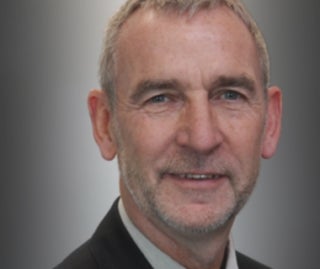
Waterloo’s new provost embraces change
Respected insect neurobiologist, experienced administrator joins Waterloo in July

Respected insect neurobiologist, experienced administrator joins Waterloo in July
By Staff Communications and Public AffairsUniversity of Waterloo’s newly appointed vice-president academic and provost is a respected researcher and seasoned administrator, with a strong focus on improving student experience.
 Ian Orchard, a distinguished professor of biology, has deep administrative experience as vice-president of the University of Toronto and principal of the University of Toronto Mississauga. He will begin his five-year term at Waterloo on July 1, 2014.
Ian Orchard, a distinguished professor of biology, has deep administrative experience as vice-president of the University of Toronto and principal of the University of Toronto Mississauga. He will begin his five-year term at Waterloo on July 1, 2014.
Orchard led the growth and development of the University of Toronto Mississauga as it transformed into a semi-autonomous campus of the University of Toronto during his eight-year term as principal. Under his leadership, the institution doubled its enrolment, increased its intake of international students and saw a rise in entrance averages for domestic students.
Orchard says leading large-scale change can be exhilarating, but requires communication, consultation and constant attention.
At the University of Toronto, Orchard also served as the first vice-provost, students, and held positions as vice-dean and associate dean in the Faculty of Arts and Science. Enhanced student experience is a key priority identified in Waterloo’s Strategic Plan, and something that Orchard is passionate about.
“I firmly believe in the student-centred research university,” Orchard says. “We must all participate in creating an environment for success which attracts and retains the best students, faculty and staff; an environment which allows individuals to be successful and achieve their own goals and ambitions.”
To create an environment where students feel welcome, respected and at ease, universities must identify barriers to success and ensure they are broken down, he says.
At the University of Toronto, Orchard helped implement the university’s student financial aid program and guaranteed funding packages for doctoral-stream students. Toronto recognized his contribution in 2010 by establishing the Orchard Student Initiatives Fund. Its goal is to enhance the student experience and strengthen the sense of community through the funding of student-led projects and events.
As vice-president academic and provost, Orchard will be a key player in guiding Waterloo through the transformative changes identified in the University’s new Strategic Plan.
“His proven track record as a forward-thinking and engaged senior administrator with a commitment to excellence makes Professor Orchard a natural choice as Waterloo’s next vice-president academic and provost,” says Feridun Hamdullahpur, president and vice-chancellor of the University of Waterloo. “His breadth of talent and experience will support us in our efforts to become one of the top innovation universities in the world.”
In addition to his administrative experience, Orchard is a respected researcher and an expert in insect neurobiology. Early in his career, he was mentored by Roger Downer, a professor of biology at Waterloo, and participated in research at Downer’s lab.
More recently, work in Orchard’s research lab has focused on a blood-gorging bug found in Central and South America. The bug, Rhodnius prolixus, acts as a carrier for human Chagas disease — believed responsible for the death of Charles Darwin. His team’s research has helped identify the nerve cells and hormones involved in the transmission of the disease-causing parasite, and a possible way to prevent transmission. At Waterloo, Orchard will continue his research, collaborating with teams in Brazil, Toronto and elsewhere.
Funded by NSERC since 1982, Orchard has chaired the NSERC Animal Physiology Grant Selection Committee and presented numerous invited papers at international conferences. He holds a Doctor of Science degree (1988), a PhD (1975) and a BSc (1972), all from the University of Birmingham in England.
He succeeds Geoff McBoyle, who served as vice-president academic and provost on an interim basis.

Read more
Upside Robotics secures new funding to accelerate the future of sustainable farming

Read more
Discover the meticulous work that uncovered Black stories on campus and preserved them for the future

Read more
The Government of Canada announces funding to support research in food policies and medical devices
The University of Waterloo acknowledges that much of our work takes place on the traditional territory of the Neutral, Anishinaabeg, and Haudenosaunee peoples. Our main campus is situated on the Haldimand Tract, the land granted to the Six Nations that includes six miles on each side of the Grand River. Our active work toward reconciliation takes place across our campuses through research, learning, teaching, and community building, and is co-ordinated within the Office of Indigenous Relations.